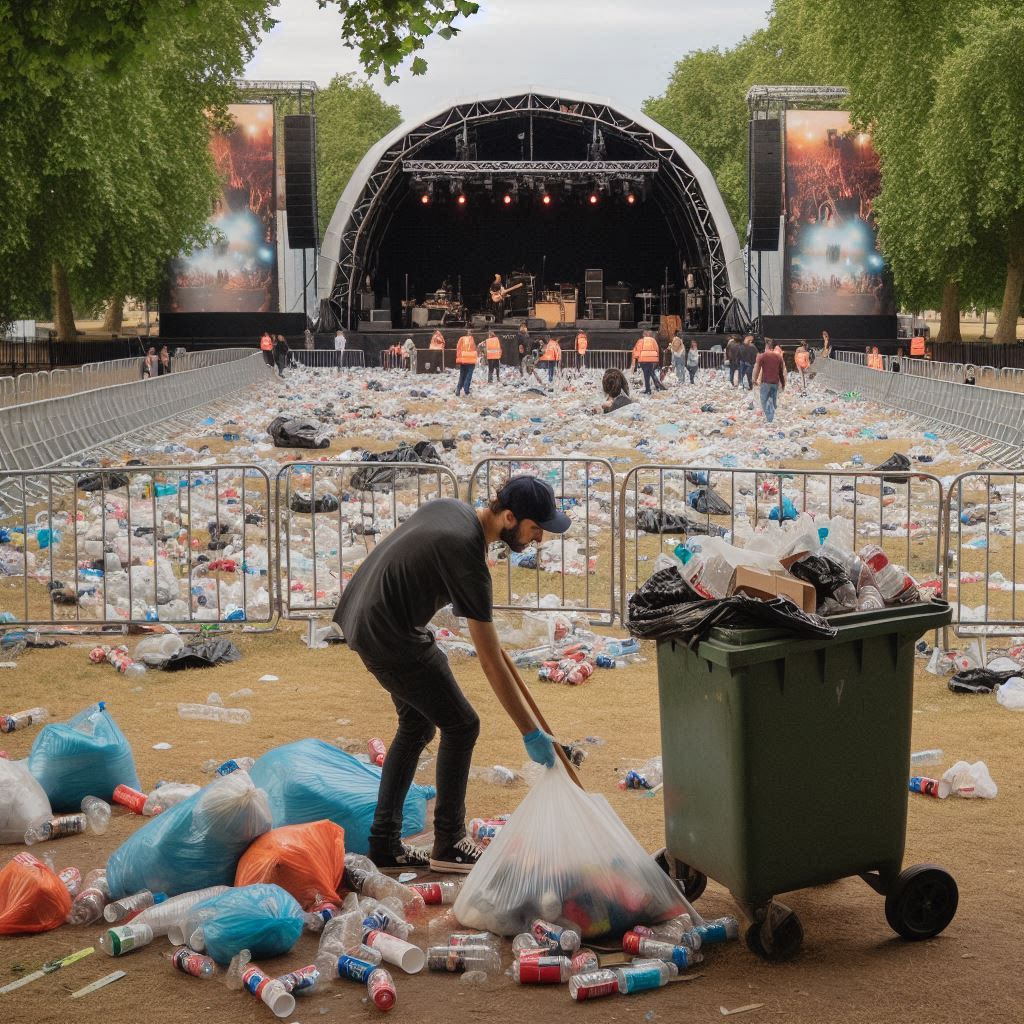I’ve seen it more times than I care to admit: the music stops, the speeches finish, the networking wraps up, and suddenly you’re left staring at a sea of plastic cups, crushed canapés, and confetti tangled in the grass. Large-scale outdoor corporate events can look seamless while they’re happening, but when it comes to cleaning, they’re a beast of their own. Proper planning makes the difference between a chaotic aftermath and a smooth, manageable cleanup. Let’s go through exactly how to tackle it.
Why Post-Event Cleaning Matters
Cleaning up after a big event isn’t just a cosmetic exercise. It has real consequences for health, the environment, and your organisation’s reputation.
Health & Hygiene Risks
Leftover food and drink can turn a pleasant outdoor space into a breeding ground for bacteria and pests. Flies, rodents, and other critters are quick to find any unattended scraps, while sticky surfaces and wet patches pose hazards for anyone walking around. Ignoring hygiene risks doesn’t just create complaints; it could lead to fines if health and safety regulations are breached.
Environmental and Local Community Concerns
Big events often happen in public parks or shared spaces. Leaving rubbish behind doesn’t just upset local wildlife; it angers neighbours and can harm community relations. Plastic cups, bottles, and single-use plates often get blown into hedges or waterways if not cleared promptly. A clean-up plan keeps the venue as welcoming as it was before your event arrived.
Reputation & Brand Value
Clients and guests notice when a company doesn’t take responsibility for its mess. Your brand could be remembered for the chaos left behind rather than the carefully curated networking experience. A structured, well-managed clean-up signals professionalism and respect for both people and places.
Assessing Your Cleaning Needs Before the Event Ends
A successful clean-up starts before the last guest leaves. Planning ahead allows you to tackle mess efficiently and avoid surprises.
Mapping Waste and High-Traffic Zones
Start by identifying where rubbish will accumulate. Food stalls, beverage stations, VIP corners, and outdoor seating areas are prime mess zones. Position bins strategically and anticipate areas where guests may gather spontaneously. This map will guide your crew and prevent bottlenecks during clean-up.
Building a Flexible Cleaning Crew
Assigning roles early is essential. Divide the team into bin runners, surface cleaners, and sweepers, but keep flexibility in mind. Events rarely follow the exact plan, so your crew needs to pivot quickly. Experience shows that a team ready to adapt is the backbone of an efficient post-event clean-up.
Stocking the Right Equipment and Supplies
The right tools save time and reduce frustration. Heavy-duty bin bags, tarpaulins, brooms, mops, gloves, and disinfectants are the basics. Don’t forget contingency supplies like extra gloves, wet-weather gear, or portable lighting for late finishes. Preparing thoroughly means fewer delays when the real work starts.
Cleaning During the Event – Real-Time Strategies
Waiting until the last guest leaves isn’t always smart. Small, ongoing interventions prevent chaos and make the post-event clean-up more manageable.
Running Continuous Bin Collection
Assign a few crew members to roam with bin bags or wheelie bins. Emptying waste bins regularly avoids overflowing messes and reduces the risk of items blowing around. It’s a minor effort during the event but a huge time saver later.
Mobile Cleaning Stations
Set up mini cleaning stations near food stalls and high-traffic areas. Stock them with wipes, disinfectant sprays, and hand sanitiser. These stations allow quick responses to spills and keep surfaces manageable throughout the day.
Responding to Emergencies or Weather
Outdoor events can be unpredictable. A sudden downpour or gust of wind can scatter rubbish and leave paths slippery. Your team should be ready to act fast — covering waste, sweeping puddles, and relocating wet items before they create bigger issues.
The Post-Event Deep Clean
Once the event ends, it’s time for a structured, thorough clean. This is where preparation pays off.
Initial Sweep & Triage
Begin with a general sweep, separating recyclables, food waste, and general rubbish. Large items like broken furniture or signage should be cleared first to create clear walking space for your team. Sorting early prevents bottlenecks later in the process.
Targeted Area Cleaning
Prioritise areas where guests spent the most time. VIP zones, food stations, and restrooms should be tackled before open lawns or parking zones. Use appropriate tools for each surface — scrubbing mats, pressure washing hard paths, or sweeping gravel areas. Efficiency comes from methodically moving from high-priority to low-priority zones.
Tackling Tough Spots: The Mud, The Grime, The Leftovers
Outdoor events inevitably leave stubborn spots. Muddy patches near entrances, spilled drinks on decking, and confetti embedded in grass require extra attention. Use tarps to gather scattered debris, and assign teams to tackle difficult areas in rotation to prevent fatigue. It’s gruelling work, but tackling it systematically ensures no area is overlooked.
Final Stage – Polishing & Inspection
The final touches matter. Wipe down tables and surfaces, hose paths if necessary, and double-check bins are emptied. Walk the entire site to ensure nothing has been missed. The aim is to leave the venue in a condition that exceeds expectations, restoring both appearance and safety.
Logistics, Team Coordination & Safety
Cleaning after a large event is a team sport. Clear communication and safety measures are essential.
Communication Channels
Use radios, mobile phones, or even designated leaders to keep everyone in sync. Everyone should know their zones, responsibilities, and what to do if the plan changes. Coordinated teams work faster and avoid redundant effort.
Safety Measures & PPE
Safety is non-negotiable. Gloves, boots, high-visibility jackets, and rain gear keep the crew protected. Hydration breaks and shift rotations prevent fatigue. Have a first-aid plan ready — accidents can happen, especially when dealing with slippery surfaces or heavy loads.
Environmental & Waste Disposal Logistics
Waste isn’t just about picking it up; it has to go somewhere. Coordinate with local councils or contractors for collection and disposal. Separate recyclables, compostable waste, and general rubbish. If hazardous materials like broken glass or signage are present, follow the proper disposal procedures.
Sustainability & Getting Green About It
Events can leave a lasting footprint, so post-event cleaning should consider the environment.
Using Eco-Friendly Cleaning Products
Choose biodegradable or plant-based cleaners to reduce chemical impact. Avoid harsh chemicals that can harm grass, soil, and wildlife. Eco-friendly solutions protect both the site and your crew.
Recycling and Composting
Separate bins for recycling and composting make a tangible difference. Encourage staff to properly sort waste, and coordinate with local recycling centres to ensure items don’t end up in landfill unnecessarily.
Reducing Carbon Footprint of Cleaning Operation
Use local teams to reduce transport emissions. Plan routes for waste collection efficiently, and minimise multiple trips to dispose of rubbish. Small changes across a large event can significantly reduce environmental impact.
Post-Clean Review & Feedback Loop
After the last broom is stored, take a moment to reflect. Reviewing the process helps improve future operations.
Conducting a Debrief
Gather your crew to discuss what worked and what didn’t. Weather issues, supply shortages, or staffing gaps can be noted so solutions are ready for next time.
Gathering Client & Stakeholder Feedback
Ask organisers how they felt about the clean-up. Did the site meet their expectations? Was anything overlooked? Feedback helps refine strategy and shows professionalism.
Documenting for Next Events
Create a cleaning playbook or checklist. Include lessons learned, useful supplier contacts, and estimated time per area. Documentation transforms each event into a learning opportunity, reducing stress for future clean-ups.
Costing and Budgeting Your Cleaning Operation
Cleaning isn’t free. Budgeting upfront avoids nasty surprises later.
Estimating Labour Costs
Calculate how many staff are needed, factoring in shift length, breaks, and overtime. Flexibility costs extra but prevents under-staffed chaos.
Materials & Equipment Budget
Include costs for gloves, tarps, brooms, mops, disinfectants, and any specialised tools. Plan for wear and tear, too — large events can take a toll on supplies.
Waste Disposal Fees
Factor in charges for general waste, recycling, composting, and hazardous waste. Don’t underestimate the cost of council permits or skips if needed.
Contingency & Unexpected Costs
Weather, unforeseen messes, or last-minute site changes can add expenses. A contingency buffer keeps the clean-up manageable and avoids cutting corners.
Real-Life Story: When Plans Meet Reality
I remember a corporate event in a large city park where the sun shone all day. Everything looked perfect until the end. The VIP area was carpeted in champagne corks, and the main networking zone had mud tracks from hurried guests. With careful planning, a well-coordinated crew, and some ingenuity — tarps for debris, mobile cleaning stations for quick spot-cleaning, and a team rotation system — we left the park spotless by midnight. Guests and organisers alike were impressed, and the city council didn’t even blink. It was a messy day, but planning turned it into a triumph.
Cleaning up after a large-scale outdoor corporate event doesn’t have to be overwhelming. With preparation, flexibility, and attention to sustainability, you can transform what looks like chaos into a smooth, manageable process. Proper planning, a well-equipped crew, and structured post-event steps make all the difference. Even for the biggest events, the effort pays off — leaving organisers smiling, guests impressed, and the venue better than before. If you want to get it done properly, calling in professionals — like the Catford Cleaning Gals for advice — ensures your clean-up is as seamless as your event itself.


